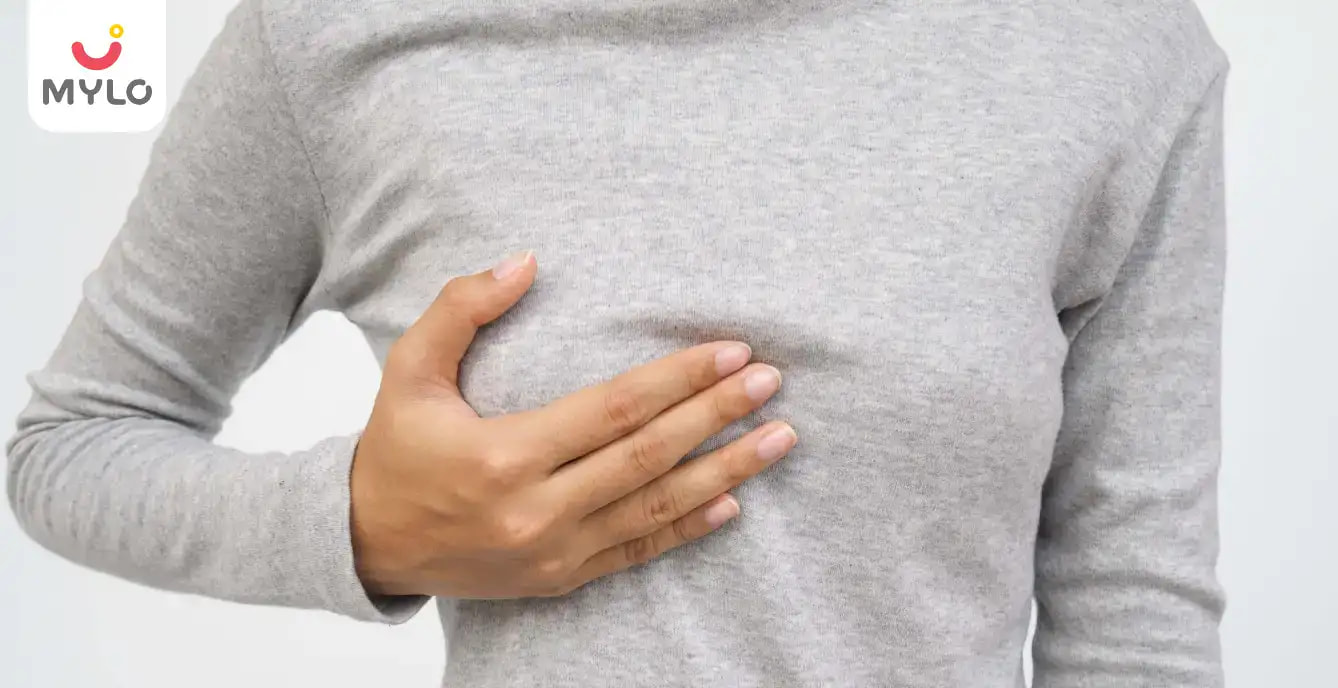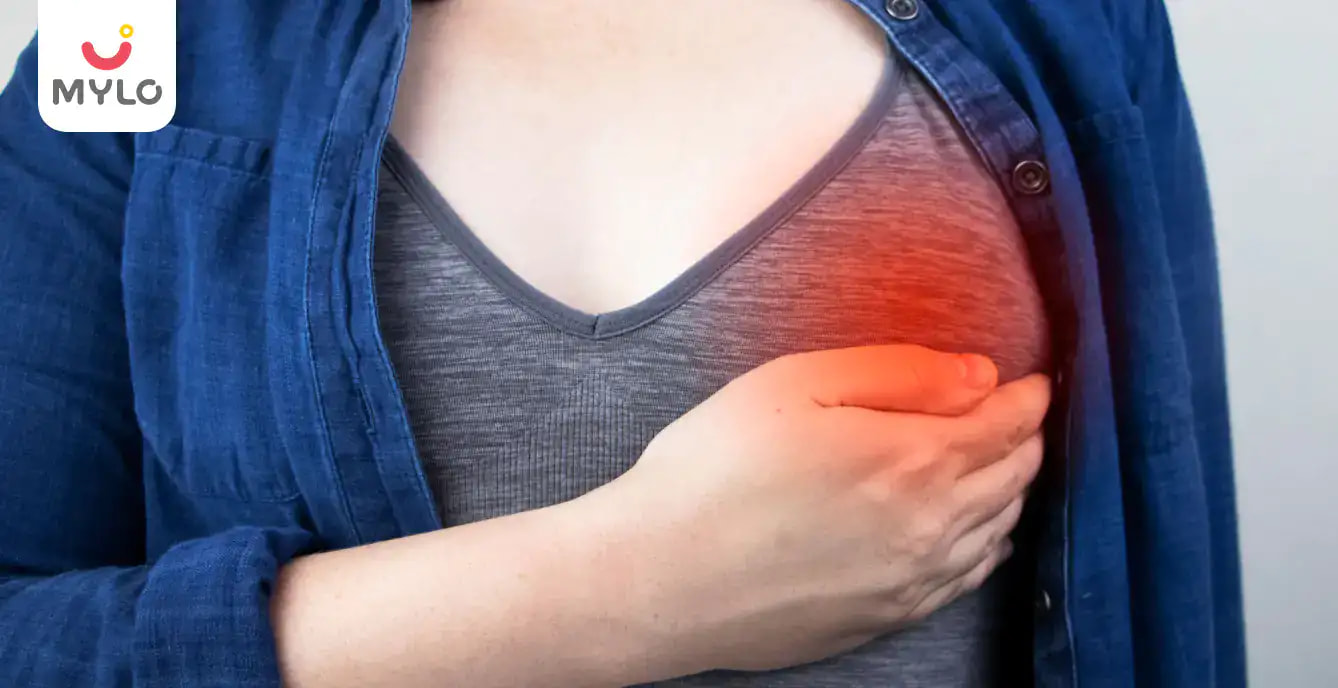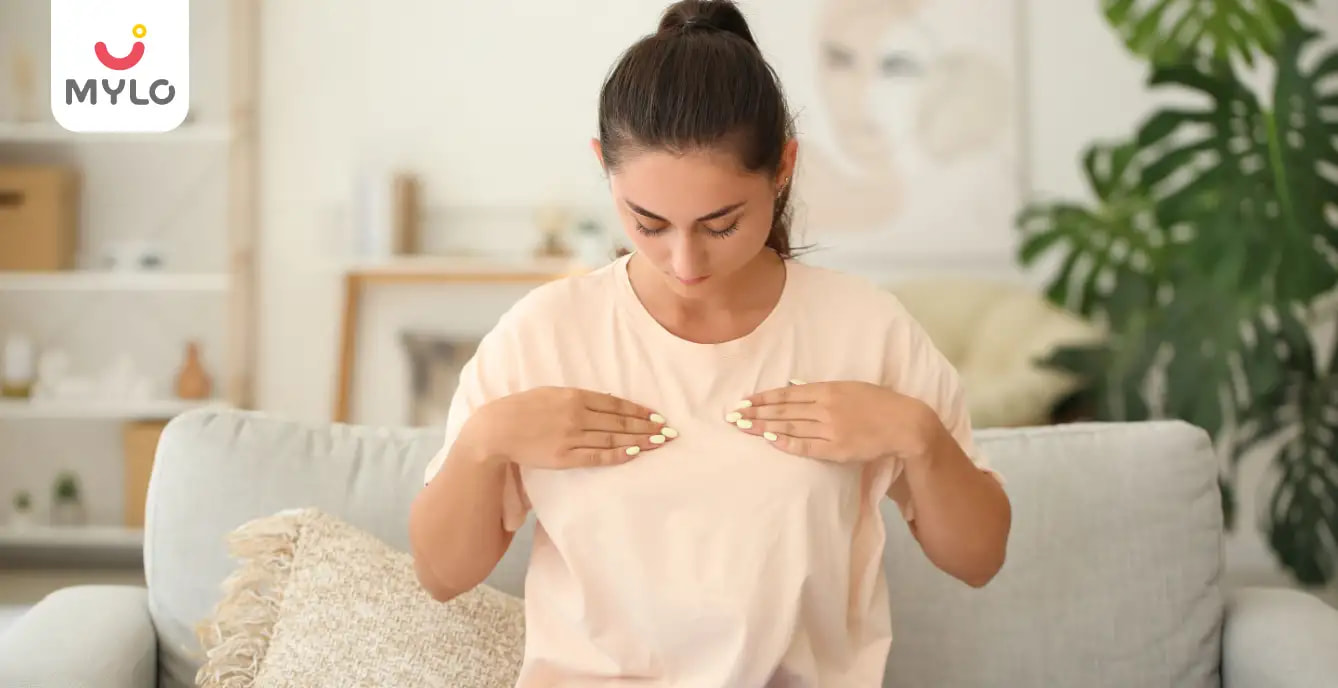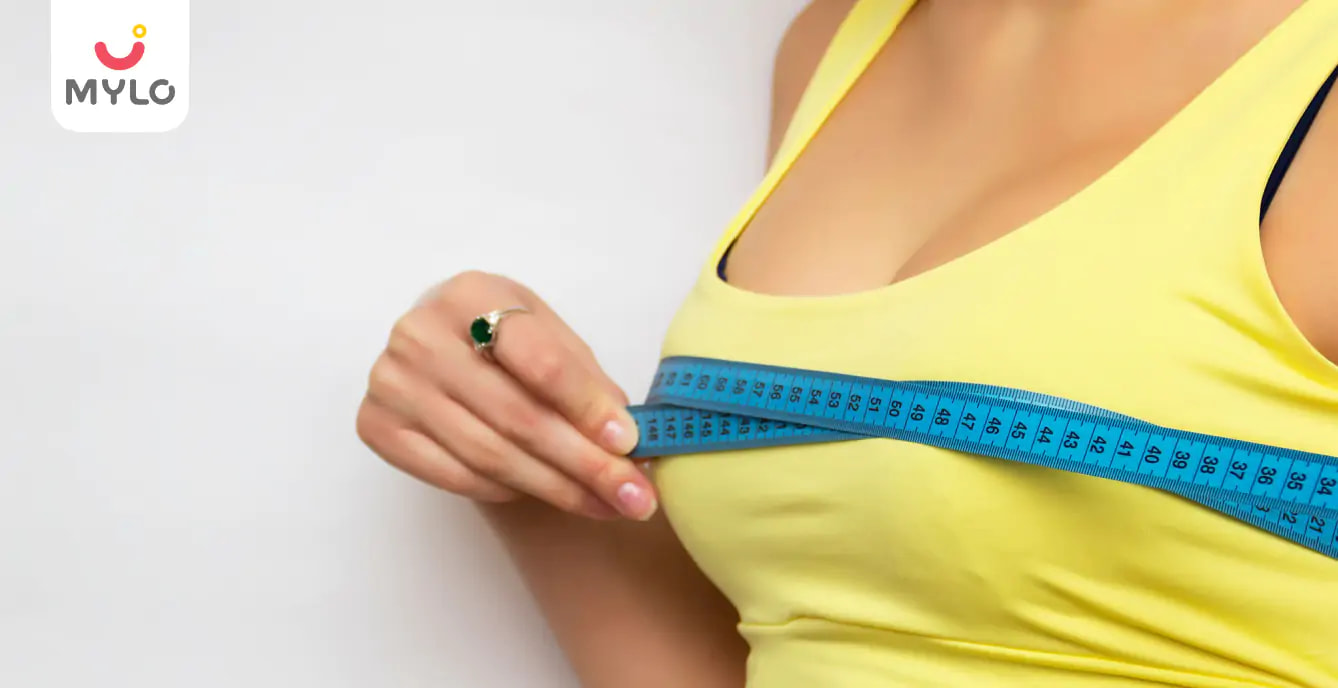Home

Breast Cancer: Types, Causes, Symptoms
In this Article
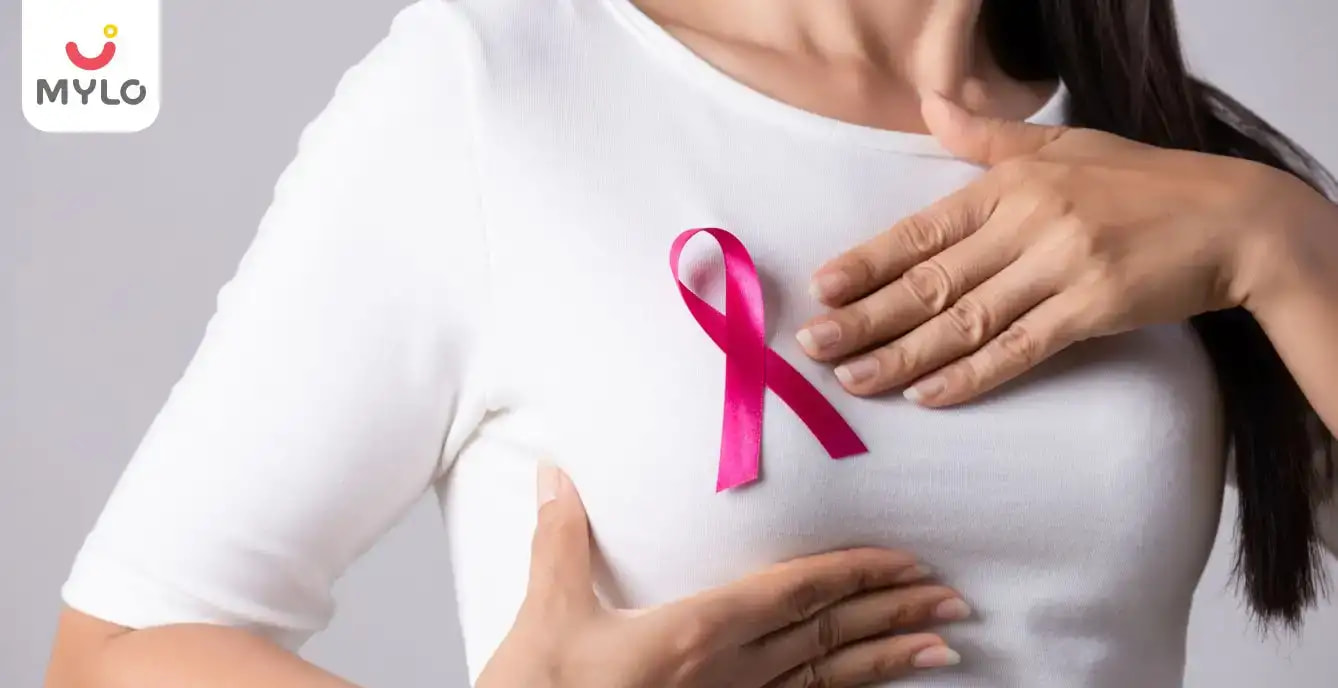
Breast Lump
Breast Cancer: Types, Causes, Symptoms
Updated on 3 November 2023
Cancer is formed when changes called mutation occur in genes that regulate cell growth. The mutation allows the cells to divide and multiply in a very uncontrolled manner. Breast cancer is a type of cancer that develops in breast cells. It occurs either in the lobules or the ducts of the breast. Lobules are glands that are responsible for the production of milk and ducts are the paths through which milk passes from the glands to the nipples. Cancer can occur in the fatty tissue as well as fibrous connective tissue within the breast.
10 early signs or symptoms of breast cancer
The following are the early signs or symptoms of breast cancer, identifying these symptoms can enable women to seek treatment as soon as possible:
1) Lump detection
Check for lumps by applying pressure on the breasts and surrounding tissues with your fingers. Lumps are usually formed around the armpit, collarbones, lymph nodes or nipples.
2) Itchiness in breasts
Rashless itchiness in and around your breast.
3) Swollen breasts
Swelling in the breasts along with patchy, burning skin that feels extremely sensitive to the touch or caress.
4) Neck and shoulder stiffness
If you have pain or stiffness in the neck, back, spine or shoulder contact your doctor.
5) Change in breast size
A breast tumour changes the size of the affected breast, so look out for any changes in the size of your breast.
6) Breast tenderness
A lump develops like a tiny seed-like structure along the breast tissue which may cause the breast to feel tender when you lie down.
7) Nipple discharge
If the breast cancer develops in the milk ducts it may lead to watery, milky or blood-tinged discharge.
8) Nipple sensitivity
In case abnormally sensitive nipples suddenly become void of sensitivity, the underlying cause may be breast tumours.
9) Nipple changes
If you are not breastfeeding and your nipple becomes inverted, flat, indented, or asymmetrical in shape.
10) Dimpled breast tissue
The skin over the breasts becomes red, dimpled, or even appears pitted or wrinkly similar to skin that covers an orange.
Breast cancer types (invasive and non-invasive)
There are four types of breast cancer, which include both invasive and non-invasive:
1) Ductal carcinoma in Situ (non-invasive)
In this, the cancer cells are confined to the ducts of your breast and haven't invaded the surrounding breast tissue.
2) Lobular carcinoma in Situ
It occurs in the milk-producing glands of your breasts. Cancer cells do not affect the surrounding tissue.
3) Invasive ductal carcinoma
It begins in the breast's milk ducts and then spreads to nearby tissues in your breast. Later, it can begin to spread to other nearby tissue and organs.
4) Invasive lobular carcinoma
This first develops in the breast's lobules and then spreads to nearby tissue or tissues.
Some other types of breast cancer
Other less common types of breast cancer include:
1) Paget disease of the nipple
2) Phyllodes tumour
3) Angiosarcoma
4) Inflammatory breast cancer
5) Triple-negative breast cancer
Causes of Breast Cancer
Breast cancer happens when abnormal cells in your breast divide and multiply. Research says that there are some risk factors which increase the chances of getting breast cancer. These risk factors are:
1) Age
Being more than 55 increases your chances of getting breast cancer.
2) Sex
Most likely in women.
3) Family History and genetics
If your parents, siblings, children other close relatives have such a disease, then there are more chances of getting breast cancer.
4) Smoking
Tobacco is the leading cause of many types of cancer, including breast cancer.
5) Alcohol use
Consumption of alcohol can also increase the risk of getting breast cancer.
6) Obesity
Obesity can increase the risk of breast cancer as well as breast cancer recurrence.
7) Radiation exposure
If you've had prior radiation therapy, especially in the head, neck or chest, you are more likely to get breast cancer.
8) Hormone replacement therapy
People who use hormone replacement therapy are having more chances of being diagnosed with breast cancer.
Treatment of breast cancer
Your doctor advises you a breast cancer treatment options based on cancer stage & grade, size, and type of breast cancer and also it is based on overall health & your preferences.
Treatment of breast cancer includes
i) Breast cancer surgery
ii) Radiation therapy
iii) Chemotherapy
iv) Hormone therapy
v) Targeted therapy drugs
vi) Immunotherapy
vii) Supportive (palliative) care
Conclusion
Be aware of all the facts related to breast cancer. Whenever you find any symptoms, talk to your doctor immediately. Timely check-ups, breast self-evaluation, or if you find out any lumps, immediately go for diagnosis. Women should start getting a yearly mammogram done from the age of 40 because early diagnosis and treatment can help in dealing with breast cancer.
You may also like https://mylofamily.com/article/breast-diseases-types-symptoms-diagnosis-179649.
References
- Keyser EA, Staat BC, Fausett MB, Shields AD. Pregnancy-associated breast cancer. www.ncbi.nlm.nih.gov



Written by
Kavita Uprety
Get baby's diet chart, and growth tips

Related Articles
Related Questions
Influenza and boostrix injection kisiko laga hai kya 8 month pregnancy me and q lagta hai ye plz reply me

Hai.... My last period was in feb 24. I tested in 40 th day morning 3:30 .. That is faint line .. I conculed mylo thz app also.... And I asked tha dr wait for 3 to 5 days ... Im also waiting ... Then I test today 4:15 test is sooooo faint ... And I feel in ma body no pregnancy symptoms. What can I do .

Baby kicks KB Marta hai Plz tell mi

PCOD kya hota hai

How to detect pcos

Related Topics
RECENTLY PUBLISHED ARTICLES
our most recent articles

Diet & Nutrition
গর্ভাবস্থায় আলুবোখরা: উপকারিতা ও ঝুঁকি | Prunes During Pregnancy: Benefits & Risks in Bengali

Diet & Nutrition
গর্ভাবস্থায় হিং | ঝুঁকি, সুবিধা এবং অন্যান্য চিকিৎসা | Hing During Pregnancy | Risks, Benefits & Other Treatments in Bengali

Women Specific Issues
স্তনের উপর সাদা দাগ: লক্ষণ, কারণ এবং চিকিৎসা | White Spots on Nipple: Causes, Symptoms, and Treatments in Bengali

Diet & Nutrition
গর্ভাবস্থায় পোহা: উপকারিতা, ধরণ এবং রেসিপি | Poha During Pregnancy: Benefits, Types & Recipes in Bengali

Diet & Nutrition
গর্ভাবস্থায় মাছ: উপকারিতা এবং ঝুঁকি | Fish In Pregnancy: Benefits and Risks in Bengali

Diet & Nutrition
গর্ভাবস্থায় রেড ওয়াইন: পার্শ্ব প্রতিক্রিয়া এবং নির্দেশিকা | Red Wine During Pregnancy: Side Effects & Guidelines in Bengali
- ইনার থাই চ্যাফিং: কারণ, উপসর্গ এবং চিকিৎসা | Inner Thigh Chafing: Causes, Symptoms & Treatment in Bengali
- গর্ভাবস্থায় ব্রাউন রাইস: উপকারিতা ও সতর্কতা | Brown Rice During Pregnancy: Benefits & Precautions in Bengali
- Velamentous Cord Insertion - Precautions, Results & Safety
- Unlock the Secret to Flawless Skin: 7 Must-Have Qualities in a Face Serum
- Unlock the Secret to Radiant Skin: How Vitamin C Serum Can Transform Your Complexion
- Gender No Bar: 10 Reasons Why Everyone Needs a Body Lotion
- Unlock the Secret to Radiant Skin How to Choose the Perfect Body Lotion for Your Skin Type
- Top 10 Reasons to Apply a Body Lotion After Every Bath
- Communication in Toddlers: Milestones & Activities
- How to Improve Vocabulary for Toddlers?
- A Comprehensive Guide to Understanding Placenta Accreta
- Vulvovaginitis in Toddlers Causes, Symptoms and Treatment
- A Comprehensive Guide to Understanding Cerebral Palsy in Children
- Bitter Taste in Mouth During Pregnancy: Understanding the Causes and Remedies


AWARDS AND RECOGNITION

Mylo wins Forbes D2C Disruptor award

Mylo wins The Economic Times Promising Brands 2022
AS SEEN IN

- Mylo Care: Effective and science-backed personal care and wellness solutions for a joyful you.
- Mylo Baby: Science-backed, gentle and effective personal care & hygiene range for your little one.
- Mylo Community: Trusted and empathetic community of 10mn+ parents and experts.
Product Categories
baby carrier | baby soap | baby wipes | stretch marks cream | baby cream | baby shampoo | baby massage oil | baby hair oil | stretch marks oil | baby body wash | baby powder | baby lotion | diaper rash cream | newborn diapers | teether | baby kajal | baby diapers | cloth diapers | laundry detergent 6472 | lactomama lactation granules |



